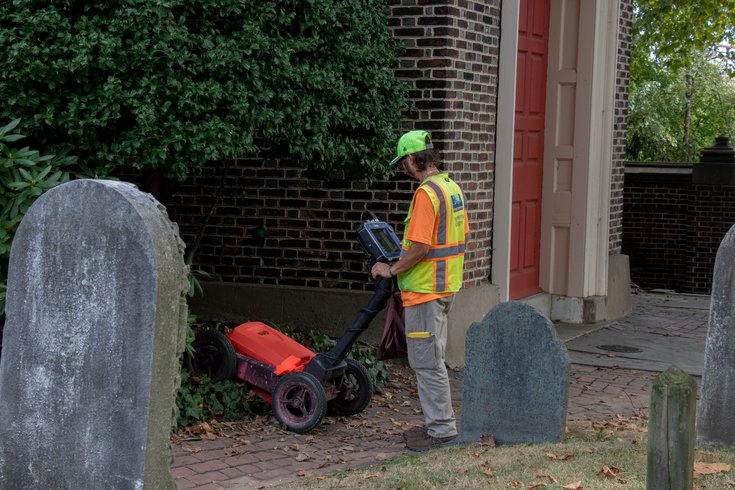
December 13, 2024
 Provided Image/Michelle Lipnitsky for Colliers
Provided Image/Michelle Lipnitsky for Colliers
Gloria Dei Church and engineering company Colliers recently teamed up to use ground-penetrating radar to locate the grave of Peter Rambo, who's one of the founders of the New Sweden settlement.
While the cemetery at Gloria Dei Episcopal Church has been in continuous operation since 1677, predating Philadelphia itself, documentation with burial locations didn't exist until a tombstone inscription book was made in 1877, leaving a 200-year gap in the records.
Although some of those older monuments are still identifiable, others — especially those made of marble — sunk or deteriorated completely. As a result, the location was unknown for a number of the remains — including Peter Gunnarsson Rambo, who's one of the founders of the New Sweden settlement. That is, until one of Rambo's descendants from Texas showed up on the Queen Village grounds.
San Antonio resident Todd Compton, the son of former Phillies catcher Michael Compton, is the geo-environmental division director at Colliers, an engineering design firm with an office in Mount Laurel. A longtime fan of genealogy and family folklore, he stopped at Gloria Dei while traveling in the area hoping to find the burial site of Rambo, his distant relative.
Rambo, who lived from 1611 to 1698, was one of the first colonists in New Sweden when he arrived in 1640. He would go on to be a member of the the Governor's Council, magistrate and justice of the peace. He also witnessed the acquisition of Delaware County from Native Americans to William Penn. He's also credited with bringing the seeds for Rambo apples from Sweden to the area.
Church leadership knew Rambo had been buried at Gloria Dei, but they weren't able to tell Compton exactly where.
"When he died, there were already plans in place to build the brick church that exists today, so the thought was that he was probably buried next to the previous church," said Amy Grant, chair of the Historic Gloria Dei Preservation Corp. "We didn't know exactly where that building was. We had anecdotal folklore suggesting it was 'right next to' the current building, but right next to could mean any side."
Compton, though, didn't discredit the oral history — and wanted to know more.
"Don't discount family stories, don't discount what the neighbor tells you, this is how you formulate a plan for study," Compton said.
The preservation group was already looking into using ground-penetrating radar to locate some of these graves but was unable to raise the funds. Using a device that looks similar to a lawn mower, it scans soil with electromagnetic waves and searches for abnormalities in the ground without the need to dig. Grant connected with Compton, who uses the technology in his work, and he offered his company's services at no cost.
In late September, Compton and his team found a site they believe to be Rambo's — exactly where folklore always said it was. The radar showed Rambo was only a few feet below the surface level, so Compton said he was inspired to stick his fingers into the soil and speak to his ancestor.
"It wasn't a long conversation, but I was talking to him like 'I found you, man,'" Compton said. "'This is important. It's important that you know that we know that you're here, that you're still loved by your descendants and we're proud to come from you.'"
Going forward, Grant said she wants to recognize Rambo's final resting place in some way. Compton and his team plan to continue to search at Gloria Dei for more graves — including of Andris Souplis, the first sheriff of Germantown, and a number of Lutherans who were buried on the grounds but didn't receive markers.
"That's part of of honoring your past and those people deserve to be recognized," Compton said. "You'll never know who they are, but that doesn't matter, that should never matter, just knowing that someone's there and you're cognizant of that and respectful of it. I think that's very important."